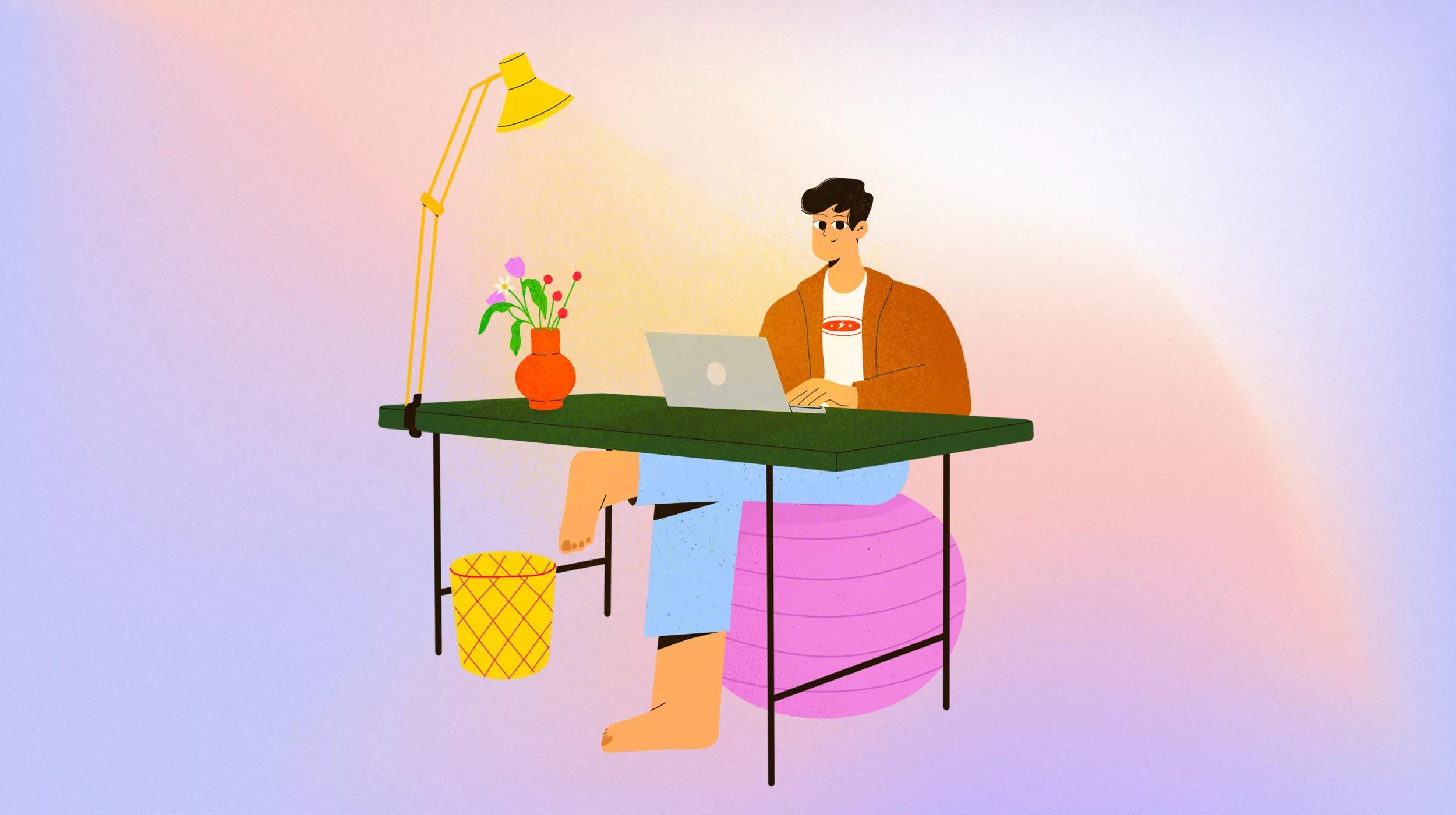Making money online is no longer a far-fetched idea; millions of people are earning income at home every day. The online world keeps expanding, and new opportunities continue to pop up across every field. AI-related jobs, for example, are offering fresh ways for creators and entrepreneurs to work more efficiently and reach wider audiences.
The best part about making money online is that it allows you to turn your creative skills, technical know-how, or industry experience into something that generates real results from the comfort of your own home.
Let’s explore practical ways to make money online, how to get started, and the tools that can help you grow your digital income.
Disclaimer: This content is provided for informational purposes only, and should not be construed as legal advice from GoDaddy on any subject matter.
1. Become a freelance writer
If you enjoy expressing ideas through words, freelance writing can be one of the most rewarding ways to make money online. Businesses, bloggers, and brands are always looking for skilled writers to help with articles, web copy, email campaigns, and more. You can build your portfolio and client base from anywhere, one project at a time.
How to get started
- Identify the type of writing you enjoy most, like blog content, product descriptions, or social media copy.
- Create writing samples to showcase your skills and add them to an online portfolio or personal website.
- Reach out to potential clients through your network—learn how to get freelance business clients here.
Best platforms and tools
- Upwork, Freelancer, and Fiverr for entry-level projects.
- LinkedIn and industry job boards for direct client connections.
- GoDaddy’s Website Builder to host your portfolio and client testimonials.
Tips for success
- Communicate clearly and meet deadlines consistently.
- Specialize in a niche you enjoy, such as travel, finance, or technology.
- Keep learning about SEO and content strategy to increase your value as a writer.
2. Sell proofreading and editing services
With the rise of digital content, there’s a growing demand for polished, error-free writing. Writers, students, and businesses all need help ensuring their work is clear, professional, and impactful.
Offering proofreading and editing services allows you to help others succeed while turning your linguistic skills into income. It’s flexible, detail-oriented work that can easily fit around your schedule or become a profitable small business.
How to get started
- Familiarize yourself with different style manuals, like The Chicago Manual of Style, The Associated Press Stylebook (AP Style), and the Modern Language Association (MLA).
- Build a portfolio website and share sample edits.
- Pitch your services to academic writers, bloggers, and small publishers.
Best platforms and tools
- Grammarly, Hemingway, and ProWritingAid for automated grammar checks.
- Microsoft Office, Google Workspace, or ClickUp for organizing projects.
- Reedsy, Upwork, and LinkedIn to connect with clients.
Tips for success
- Focus on clarity, tone, and structure in addition to grammar.
- Communicate quickly and professionally to build trust.
- Consider specializing in one area, like academic, book, or business editing.
3. Start a graphic design business
If you have an eye for aesthetics and a passion for creativity, graphic design can open doors to exciting online opportunities. Businesses constantly need high-quality visuals for branding, advertising, and social media. Building a graphic design business enables you to combine artistry with entrepreneurship and work on projects that inspire you.
How to get started
- Build a portfolio that includes logos, social media graphics, and print designs.
- Use GoDaddy’s Website Builder to showcase your work online.
- Promote your services through social media and freelancer platforms.
Skills and tools needed
- Design tools such as Adobe Illustrator, Photoshop, or Affinity Designer.
- Miro or Figma for collaborative projects.
Tips for success
- Stay up-to-date on graphic design trends and keep refining your skills.
- Communicate clearly with clients before starting projects.
- Request testimonials from satisfied clients to build credibility.
4. Sell video editing services
Video continues to dominate digital marketing and entertainment, making skilled video editors more valuable than ever. From YouTube creators to brands and influencers, there’s constant demand for professional-looking videos that capture attention. As a video editor, you can transform raw footage into polished, engaging content that helps others stand out online.
Related: How to create video content
How to get started
- Practice with tools like Adobe Premiere Pro, DaVinci Resolve, or Final Cut Pro.
- Post sample edits or reels on social media to attract clients.
- Build a website that highlights your services and pricing packages.
Skills and tools needed
- Reliable video editing software and sufficient computer power.
- Knowledge of pacing, transitions, and color grading.
- Backup drives or cloud storage for project files.
Tips for success
- Keep files organized and maintain a clear workflow.
- Offer revisions to build trust with clients.
- Stay informed about the latest video marketing trends and audience preferences.
5. Offer voiceover services
If you’ve been told you have a great voice—or simply enjoy reading scripts aloud—voiceover work can be a fun and profitable way to make money online. The growing demand for videos, podcasts, and audiobooks means creators everywhere are looking for voice talent to bring their projects to life.
How to get started
- Set up a quiet recording space with basic soundproofing.
- Invest in a quality microphone and pop filter.
- Record a demo reel that showcases your range and tone.
Best platforms and equipment
- Voices, Fiverr, and Upwork for booking projects.
- Audacity or Adobe Audition for editing audio.
- USB condenser microphone and simple soundproofing setup.
Tips for success
- Edit voiceovers for consistent tone and quality.
- Continue practicing with different types of voiceover work.
- Build a website to feature demos and make client outreach easier.
6. Offer transcription services
Companies depend on words, and pulling them from interviews, meetings, or legal recordings isn’t always easy for AI. If you have fast typing skills and an ear for accuracy, transcription can be a reliable online job that rewards precision and focus. Many businesses, medical offices, and media companies need transcriptionists who can turn spoken content into clear, polished text.
How to get started
- Test your speed and accuracy at TypingTest.com to see your baseline.
- Aim for at least 60 words per minute with strong accuracy.
- Join transcription websites to start connecting with clients who prefer human-quality transcripts. Use this guide to learn more about finding your target audience.
Best platforms and equipment
- Rev, GoTranscript, and TranscribeMe for steady transcription work.
- Otter.ai or Express Scribe to assist with transcription speed.
- A comfortable headset and ergonomic keyboard for a smoother workflow.
Tips for success
- Proofread each transcript carefully before submission.
- Keep improving your typing speed to increase your earnings.
- Build client relationships through accuracy and consistency.
7. Be a virtual assistant
Becoming a virtual assistant is one of the most flexible ways to earn money online. You can support entrepreneurs, small business owners, or executives with administrative, marketing, or organizational tasks from home. This role is ideal for detail-oriented multitaskers who enjoy helping others stay on track.
How to get started
- Identify your strongest skills, such as scheduling, inbox management, or data entry.
- Create a simple portfolio that outlines your services and past experience.
- Build an online presence through Facebook groups, LinkedIn, Upwork, or Fiverr.
- Offer tiered packages to attract both small and larger clients.
Skills and tools needed
- Tools like Google Workspace, Slack, Trello, and Asana for organization and communication.
- Calendar and email management tools such as Calendly or Mailchimp.
- Design platforms like Prezi to create polished presentations or marketing assets.
Tips for success
- Be clear about your availability, pricing, and turnaround times.
- Communicate consistently and proactively with your clients.
- Keep improving your digital skills to expand your service offerings.
- Explore ways to drive traffic to your small business website to gain new clients.
8. Consider data entry gigs
Data entry remains one of the most accessible online jobs, perfect for those who are detail-oriented and reliable. Businesses rely on data entry professionals to help organize, clean, and manage large sets of information. With minimal startup costs and flexible hours, it’s an easy way to begin earning money online.
How to get started
- Create a portfolio that shows examples of organized spreadsheets and data management.
- Join Upwork or Fiverr to find clients who need accurate and fast data processing.
- Cold pitch your services to local small businesses that may need help managing records.
Skills and tools needed
- Proficiency in spreadsheets and databases like Excel, Airtable, and Google Sheets.
- Typing accuracy and attention to detail.
- Cloud storage tools like Google Drive or Dropbox to share files securely.
Tips for success
- Double-check your work for typos or formatting errors before submitting.
- Create templates for repeat projects to save time.
- Offer fast turnaround for small projects to build reviews and repeat clients.
9. Offer online tutoring
Online tutoring lets you share your knowledge with learners around the world. Whether you’re passionate about math, writing, or languages, there’s always a demand for qualified tutors who can make complex subjects easier to understand. It’s flexible, fulfilling work that helps students succeed while giving you control over your schedule.
How to get started
- Choose your subject focus and determine your target grade level or skill range.
- Create profiles on tutoring platforms.
- Record short demo lessons or post helpful study tips on YouTube to attract attention.
- Include a link to your tutoring website where clients can book sessions directly.
Best platforms needed
- Wyzant, TutorMe, and Preply for one-on-one tutoring opportunities.
- Zoom or Google Meet for virtual sessions.
- YouTube, Instagram, or TikTok for showcasing your teaching style and reaching new audiences.
Tips for success
- Use interactive teaching tools like whiteboards or screen sharing to stay engaging.
- Encourage reviews and referrals from satisfied students.
- Adjust your approach to match each learner’s pace and style.
10. Offer translation services
Translation services are in high demand as businesses and individuals seek to communicate across languages. If you’re fluent in more than one language, you can help companies expand their global reach while building a steady online income stream.
How to get started
- Identify your language pairs and areas of specialization (legal, medical, technical, etc.).
- Create sample translations to demonstrate accuracy and tone.
- Build a website or LinkedIn profile showcasing your services and experience.
Skills and tools needed
- Proficiency in at least two languages, both written and spoken.
- Freelance platforms like ProZ, Gengo, or Upwork to find translation work.
- Tools like Smartcat, Trados Studio, or DeepL for translation assistance.
Tips for success
- Proofread all translations to ensure cultural and linguistic accuracy.
- Be transparent about turnaround times and word rates.
- Continue studying idiomatic expressions and cultural nuances in both languages.
11. Remote customer service representative
“Customer service representative” ranked among the top ten work-from-home roles with the greatest hiring activity in 2025, according to Forbes. With the right tools, remote reps can handle everything from phone calls and emails to live chat and social media support. This can work as a side hustle or a full-time job that offers a steady income and the flexibility to work from anywhere.
How to get started
- Learn customer support platforms like Zendesk, Freshdesk, or Intercom.
- Apply for remote roles on job sites such as LinkedIn, Remote.co, and FlexJobs.
- Highlight soft skills like empathy, communication, and problem-solving in your applications.
- Include any previous measurable achievements in your resume.
Skills needed
- Strong written and verbal communication skills.
- Patience, active listening, and multi-tasking.
- Familiarity with CRM tools and help desk software.
Tips for success
- Maintain professionalism and empathy in every customer interaction.
- Track recurring issues to suggest process improvements.
- Manage your time carefully to balance multiple channels.
12. Sell website development services
Every business needs a strong online presence, and web developers make that happen. Offering website development services allows you to help clients build functional, engaging websites that attract and convert visitors. This field offers flexibility, creativity, and endless opportunities for growth. As your portfolio grows, so does your ability to attract high-value clients.
How to get started
- Learn the basics of HTML, CSS, and JavaScript.
- Build sample websites to showcase in your portfolio.
- Network on LinkedIn, Fiverr, and Upwork to find potential clients.
- Use GoDaddy Pro to manage multiple client websites and streamline maintenance.
Tools needed
- Visual Studio Code or Sublime Text for coding.
- Google Analytics and SEO plugins to track performance.
- Project management tools like Trello for organization.
Tips for success
- Offer responsive, mobile-friendly designs to meet modern needs.
- Stay up to date on web design trends and accessibility standards.
- Build long-term relationships with clients through ongoing support and updates.
- Communicate clearly with clients about timelines and deliverables.
13. Create apps
If you’re tech-savvy or love problem-solving, building apps can turn your creativity into income. From mobile games to productivity tools, the possibilities are endless—and so is the potential for growth as more businesses go digital.
How to get started
- Learn programming languages such as Swift, Kotlin, or JavaScript.
- Explore app-building platforms like Flutter or React Native.
- Start small with simple apps to test ideas and gain experience.
- Publish your apps on Google Play or the Apple App Store to begin monetizing.
Tools needed
- Android Studio or Xcode for app development.
- GitHub for version control and collaboration.
- Firebase for backend support and analytics.
- Figma or Sketch for designing user interfaces.
Tips for success
- Focus on solving real problems or simplifying daily tasks.
- Test your app thoroughly before release to ensure a smooth user experience.
- Gather user feedback and continuously improve your product.
- Consider offering in-app purchases, ads, or subscriptions for recurring revenue.
14. Provide digital marketing consulting
If you understand online trends, analytics, and customer engagement, digital marketing consulting is a smart way to earn money online. Businesses constantly need help with SEO, email marketing, content strategy, and PPC campaigns to strengthen their online presence. You can help brands reach their ideal audience, optimize their campaigns, and see real, measurable results.
How to get started
- Create a portfolio website highlighting client results and testimonials.
- Choose a focus area, such as email marketing, SEO, or paid advertising.
- Build your presence on LinkedIn and share insights that demonstrate your expertise.
- Offer free audits or consultations to attract clients.
Tools and skills needed
- Google Analytics, SEMrush, and Ahrefs for SEO analysis.
- Mailchimp or HubSpot for email campaigns.
- Meta Ads Manager or Google Ads for PPC.
- Strong copywriting and data interpretation skills.
Tips for success
- Stay updated on new marketing tools and algorithm changes.
- Focus on measurable outcomes to show clients tangible ROI.
- Communicate strategy and results clearly and consistently.
15. Offer social media marketing services
Social media marketing is a booming industry that gives you the chance to turn your creativity and communication skills into income. Businesses rely on social media experts to grow their audiences, boost engagement, and increase sales. You can help brands connect with customers while managing content calendars and ad campaigns that make an impact. This is a flexible gig that can grow quickly.
How to get started
- Build a portfolio showcasing campaigns, content calendars, and growth metrics.
- Start finding clients through Facebook groups, Fiverr, LinkedIn, or Upwork.
- Track engagement metrics to demonstrate the success of your work.
Tools and skills needed
- Social scheduling tools like Hootsuite, Buffer, or Later.
- GoDaddy app and Adobe Express for creating branded visuals.
- Data analysis and copywriting skills to boost engagement.
- Knowledge of social media algorithms and trends.
Tips for success
- Post consistently and respond quickly to audience interactions.
- Test different content types to see what resonates most.
- Use analytics to guide future strategy and improve performance.
16. Sell SEO services
Businesses depend on search engine optimization (SEO) services to improve their visibility, attract organic traffic, and boost sales. If you’re skilled in keyword research, content optimization, and link building, you can help brands rise in search rankings while building a consistent income stream. SEO is a long-term, high-demand field that rewards expertise and measurable results.
How to get started
- Create an online presence using GoDaddy’s Website Builder to display your services.
- Showcase past SEO results with client testimonials and data-driven examples.
- Join platforms like Upwork or Fiverr to find SEO freelance clients and reviews.
- Pitch your services directly to small businesses.
Tools and skills needed
- Familiarity with keyword research tools like Ahrefs, SEMrush, or Google Keyword Planner.
- On-page SEO and link-building strategies.
- Knowledge of technical SEO and site audits.
- Google Analytics and Search Console for tracking performance.
Tips for success
- Stay updated on Google algorithm changes and SEO trends.
- Focus on measurable outcomes such as increased traffic or conversions.
- Communicate progress clearly and provide reports for transparency.
17. Start a niche blog and monetize it
Starting a blog lets you share expertise and personal insights to attract a loyal audience and earn revenue. It’s most effective when you target a specific niche that you have in-depth knowledge of. Once your blog gains traction, you can monetize it through ads, affiliate links, sponsored posts, or digital products.
How to get started
- Choose a topic you’re knowledgeable and passionate about.
- Build a website for your blog.
- Create valuable, consistent content that solves readers’ problems or answers their questions.
- Promote your posts through social media, newsletters, or guest contributions on other sites.
Platforms and skills needed
- Writing and research skills.
- Managed WordPress or GoDaddy Website Builder for easy blog setup.
- SEO, keyword research, and content strategy skills.
- Analytics tools like Google Analytics or Jetpack for tracking growth.
Tips for success
- Focus on quality content that provides real value to your readers.
- Build an email list early to retain and engage your audience.
- Update older posts regularly to keep them relevant and optimized.
- Collaborate with other creators to expand your reach.
18. Try affiliate marketing
Affiliate marketing lets you earn money by promoting other companies’ products. When someone makes a purchase through your unique affiliate link, you earn a commission. This model works well if you enjoy writing, creating videos, or sharing product recommendations that resonate with your audience. Affiliate marketing can grow into a steady source of passive income when paired with high-traffic content like blogs, YouTube videos, or social media posts.
How to get started
- Research affiliate programs on networks like ClickBank or Amazon Associates. Read this guide to learn more about Amazon’s affiliate program.
- Choose products that align with your niche and audience interests.
- Develop a content plan to promote affiliate links through blogs, videos, or newsletters.
Platforms and skills needed
- Writing, SEO, and digital marketing knowledge.
- Google Analytics or affiliate dashboards to monitor results.
- Email marketing and social media tools to promote offers to your audience.
Tips for success
- Prioritize authenticity to build credibility by only promoting products you believe in.
- Focus on driving consistent traffic before scaling up.
- Combine affiliate links with content that educates or entertains.
19. Start a YouTube channel
Starting a YouTube channel gives you the freedom to share your passions, ideas, and expertise with a global audience. You can earn money through ads, sponsorships, and merchandise once you grow your following. From tutorials, product reviews, or vlogs, YouTube offers an opportunity to turn creativity into income.
How to get started
- Define your niche, such as finance, beauty, education, or entertainment.
- Create a YouTube account and design your channel.
- Use research tools like TubeBuddy or VidIQ to identify trending topics.
- Record and edit videos with user-friendly tools like CapCut or Final Cut Pro.
- Post regularly to keep your audience engaged.
Tools and skills needed
- A quality camera or smartphone with good lighting.
- Video editing software like CapCut, Adobe Premiere Pro, or DaVinci Resolve.
- Graphic design tools for thumbnails and branding.
- Familiarity with YouTube Studio.
Tips for success
- Pay attention to analytics to understand what performs best.
- Collaborate with other creators to reach new audiences.
- Optimize video titles and descriptions using SEO best practices.
- Consider adding affiliate links to videos for an additional revenue stream.
Related: How to sell on YouTube
20. Start your own podcast
Podcasts continue to grow in popularity, offering creators a powerful way to build communities and share insights. From storytelling to interviews and niche discussions, podcasts can reach listeners across platforms and be monetized through ads, sponsorships, and subscriptions. While it takes time to grow an audience, a well-produced podcast can become a rewarding long-term project with loyal followers and steady income.
How to get started
- Choose a niche that aligns with your expertise or interests.
- Outline episode topics and plan a consistent release schedule.
- Start promoting your podcast early via social media.
Best platforms and tools
- Buzzsprout, Podbean, or Spotify for hosting and distribution.
- Audacity or Adobe Audition for editing audio.
- A quality USB microphone and pop filter for crisp sound.
- GoDaddy app or Adobe Express for cover art and marketing graphics.
Tips for success
- Keep your audio quality professional and your topics engaging.
- Collaborate with guests who can add value and credibility.
- Post consistently to keep your audience engaged.
Related: How to make money podcasting in 2025
21. Create an online course
If you have deep knowledge of a particular skill or subject, creating an online course can be a great way to make money from home. Online learning continues to grow, and platforms now make it easier than ever to create, host, and promote your course. You can hold courses live, or record them and use them to earn passive income.
How to get started
- Choose a niche that aligns with your expertise and has proven demand.
- Outline your lessons and break them into short, easy-to-follow modules.
- Create a mix of videos, PDFs, and quizzes to keep your students engaged.
- Set competitive pricing based on value and market research.
- Promote your course on social media, through email marketing, or via influencer partnerships.
Best platforms and tools
- Teachable, Thinkific, or Udemy for hosting and selling your course.
- Loom for creating visuals and recording lessons.
- Zoom or Google Meet for live workshops or Q&A sessions.
- Email marketing tools like Mailchimp or ConvertKit to reach potential students.
Tips for success
- Gather student feedback to improve course quality.
- Offer downloadable materials and certificates to increase value.
- Stay active in your community to maintain credibility and build your audience.
22. Write an ebook
If you love writing and have expertise in a topic people want to learn about, publishing an ebook is a great creative outlet that can generate ongoing income. Digital publishing makes it simple to reach readers around the world without printing costs or a publisher.
How to get started
- Choose a topic that fits your skills and fills a gap in the market.
- Format your ebook professionally using tools like Reedsy or Scrivener.
- Consider self-publishing to save money.
- Design a landing page to showcase your book and collect reader emails for updates.
Best platforms and tools
- Amazon KDP, Smashwords, or Draft2Digital for publishing and distribution.
- BookBrush for designing a professional cover.
- Grammarly and Hemingway Editor for proofreading and polishing your text.
Tips for success
- Promote your ebook through social media, newsletters, and author collaborations.
- Encourage early readers to leave reviews to boost visibility.
- Build a library of titles within your niche to grow your audience over time.
- Spend time on your cover, title, and description—presentation is crucial.
23. Sell stock photography
If you have an eye for detail and enjoy capturing unique moments, selling stock photography can be a smart way to showcase your creativity to a global audience. Businesses, bloggers, and marketers constantly need fresh, high-quality images for websites, ads, and campaigns. Uploading your best shots to stock photo platforms can turn your camera skills into a steady stream of income while helping others tell their stories visually.
How to get started
- Use a good camera or smartphone with high-resolution capabilities.
- Edit your photos well before uploading.
- Submit your best work to stock photo platforms.
- Research trending categories like nature, business, and lifestyle to align with demand.
Best platforms and tools
- Shutterstock, Adobe Stock, and iStock for uploading and selling photos.
- Lightroom, Photoshop, or Snapseed for editing and color correction.
- Keyword tools to optimize your image titles and descriptions.
- External drives or cloud storage to organize and back up your portfolio.
Tips for success
- Focus on high-quality, well-lit, and diverse subjects.
- Upload regularly to stay visible and expand your library.
- Pay attention to licensing terms and model release requirements.
24. Monetize your online gaming
If you already spend time exploring new games or mastering competitive titles, you can turn that experience into something bigger. Today’s gaming world offers more opportunities than ever, from live streaming and sponsorships to esports tournaments and content creation. Building an engaged audience takes time, but with consistency and creativity, you can transform your gaming sessions into regular paychecks.
How to get started
- Choose a gaming niche, like speed runs, reviews, or tutorials.
- Build a channel and post gaming content consistently.
- Interact with viewers through chat, polls, and giveaways.
- Explore affiliate programs and brand partnerships related to gaming gear or titles.
- Sell in-game items or offer gaming tutorials for extra income.
Best platforms and tools
- Twitch and YouTube for streaming and community building.
- OBS Studio or Streamlabs for high-quality live broadcasts.
- Discord for engaging with your gaming community.
- Patreon for subscriber-based support and exclusive content.
Tips for success
- Post consistently and engage authentically with your audience.
- Upgrade your setup gradually to improve audio and video quality.
- Network with other streamers for cross-promotion and audience growth.
25. Be an AI prompt engineer
AI prompt engineering is one of the newest and most exciting ways to make money online. As more businesses adopt AI, they need experts who can create precise, creative prompts to guide these tools. The role blends technology, communication, and problem-solving, which is perfect for those who enjoy innovation.
How to get started
- Learn AI tools like OpenAI, Jasper, or Perplexity to understand prompt behavior.
- Document your experiments and track the outputs they produce.
- Build a portfolio showcasing your most effective prompts and outcomes.
- Offer freelance prompt creation or consulting services to businesses using AI.
Skills and tools needed
- Basic understanding of natural language processing and AI model behavior.
- Creative thinking and strong written communication skills.
- Familiarity with prompt-based platforms like ChatGPT and Claude.
- Knowledge of business applications for AI, such as marketing and automation. Explore this blog on business strategy with AI for inspiration.
Tips for success
- Keep learning about new AI models and prompt structures.
- Experiment with prompts to uncover new techniques and efficiencies.
- Market your services on LinkedIn or freelance platforms.
26. Sell digital art
The rise of digital marketplaces has opened new doors for artists to share and sell their work directly to buyers around the world. Whether you create illustrations, prints, or design elements, digital art can reach audiences instantly—no printing or shipping required.
How to get started
- Build a portfolio of your best digital pieces in multiple formats (PNG, SVG, or PSD).
- Set up an online store through GoDaddy or a marketplace like Etsy.
- Use social media platforms like Instagram or Behance to showcase your art and attract potential buyers.
- Offer custom commissions to expand your client base and increase visibility.
Skills and tools needed
- Design software, such as Procreate, Adobe Illustrator, or Photoshop.
- Strong understanding of digital file formats and image optimization.
- Reliable digital storage and organization for your art files.
Tips for success
- Create bundles or themed sets to encourage repeat purchases.
- Protect your digital art with watermarks and clear licensing terms.
- Stay active in online art communities to grow your reputation.
27. Sell print-on-demand (POD) products
A print-on-demand business lets you create and sell custom-designed products without worrying about inventory or fulfillment. Once your designs are ready, you can apply them to apparel, home decor, or accessories that get printed and shipped directly to customers. It’s a creative, low-risk way to enter the world of ecommerce.
How to get started
- Choose a product category that aligns with your interests, like apparel, mugs, or tote bags.
- Upload your designs to a POD service and connect it to your online store.
- Set your prices and create detailed product descriptions to attract buyers.
- Promote your store through social media, email marketing, and influencer partnerships.
Skills and tools needed
- Adobe Illustrator for creating eye-catching artwork.
- Social media marketing knowledge for promoting your brand.
- A reliable print-on-demand provider like RedBubble that handles production and shipping.
Tips for success
- Research trending designs and seasonal products to stay relevant.
- Test different product types to see what sells best.
- Provide high-quality mockups and lifestyle photos.
28. Start a dropshipping business
Dropshipping allows you to sell products online without storing inventory. You partner with suppliers who handle fulfillment, while you focus on marketing and customer relationships. It’s a flexible ecommerce model that can be scaled over time as your sales grow. Read this article for more information on what is ecommerce dropshipping.
How to get started
- Choose a niche and research products with consistent demand.
- Set up an online store through a dropshipping provider.
- Find reliable suppliers through directories or dropshipping platforms.
- Start marketing your store through SEO, ads, and social media campaigns.
Skills and tools needed
- Basic ecommerce and marketing knowledge.
- Familiarity with inventory and order management.
- Analytics tools to track performance and conversions.
Tips for success
- Focus on quality suppliers to avoid delays and returns.
- Offer excellent customer support to build trust.
- Test multiple ad strategies to identify top-performing products.
Your business needs a website.
29. Sell handmade goods
If you enjoy crafting or creating unique items, selling handmade goods online is a rewarding way to reach customers who appreciate authenticity and craftsmanship. From jewelry and candles to ceramics and textiles, handmade products often attract loyal repeat buyers through reputable online selling sites.
How to get started
- Choose a category that showcases your skills and creativity.
- Photograph your products in natural lighting and write detailed descriptions.
- Open an online shop or list your products on popular marketplaces.
- Use social media to connect with customers.
Skills and tools needed
- Crafting or art skills, depending on your product type.
- Photography and copywriting for online listings.
- Basic inventory and pricing management.
- An online store or a storefront through an online marketplace like Etsy.
Related: Compare Etsy vs. eBay
Tips for success
- Offer custom or personalized options to stand out.
- Price your items to reflect time, materials, and value.
- Create limited collections to build excitement and urgency.
30. Create a subscription box
Subscription boxes are a fun and reliable way to build recurring income while sharing curated items that delight customers month after month. You can design boxes around almost any theme, like self-care, special snacks, hobbies, and more. Subscription boxes are exciting for customers, so they’re great for generating recurring revenue.
How to get started
- Identify a niche that excites you and has a loyal audience.
- Partner with local brands or suppliers to curate high-quality products.
- Build an online store and offer subscription discounts for multi-month signups.
- Use packaging and branding that reflect your theme and personality.
Related: How do you build customer loyalty?
Skills and tools needed
- A website to showcase your subscription box offerings.
- Product sourcing and supplier relationship management.
- Logistics and fulfillment planning.
- Marketing automation tools.
Tips for success
- Focus on quality and consistency to retain subscribers.
- Gather feedback regularly to keep boxes fresh and relevant.
- Offer sneak peeks or exclusive items to reward loyalty.
31. Flip or sell domains for profit
Flipping domains is like owning virtual real estate. You purchase digital property, hold it as it gains value, and then sell it to someone looking for the perfect online address. Some domain investors do this as a part-time side hustle, while others build entire businesses around it.
You can resell domains through domain auctions, or you can search for new domains with strong market potential and invest strategically. GoDaddy’s Domain Academy can help you get started with step-by-step lessons on how to research, buy, and sell domains with confidence.
How to get started
- Research domain auctions on GoDaddy to understand what types of names are in demand, like premium domain names.
- Use Google Trends or keyword tools to identify topics gaining popularity.
- Register available names with strong branding potential using GoDaddy’s domain search.
- List your domains for sale on GoDaddy’s marketplace or auction platform.
- Share your listings on social media or directly with potential buyers who might be interested in that name.
Skills and tools needed
- Market research and trend analysis.
- Basic understanding of branding and digital marketing.
- Familiarity with domain registration, renewal, and transfer processes.
- Knowledge of domain pricing strategies.
Tips for success
- Focus on short, memorable names that are easy to spell and relevant to popular industries.
- When listing, write clear descriptions that explain the domain’s potential value to a buyer.
- Consider buying domains with alternative .com extensions.
32. Do alpha or beta testing for new tech
Developers need real users to test their apps, websites, and software before launch. They use early versions of tech and provide feedback to improve the product. It’s a flexible, low-commitment gig that gives you early access to the newest tech and pays you for your opinions.
How to get started
- Sign up for testing platforms such as UserTesting, Testbirds, or uTest.
- Complete screening questionnaires to qualify for specific projects.
- Test the product thoroughly and follow all feedback instructions carefully.
Skills and tools needed
- Strong attention to detail and good written communication.
- Reliable internet connection and compatible devices for testing.
- Ability to follow directions and give constructive, thoughtful feedback.
Tips for success
- Treat each test like a professional project to build a good reputation.
- Provide detailed, actionable feedback rather than vague comments.
- Record issues clearly with screenshots or video captures when possible.
33. Resell products online
If you have an eye for valuable finds, reselling can be a fun and rewarding online business. You buy items at a discount—through wholesale, thrift shops, or clearance sales—and then resell them on ecommerce platforms. This could be vintage fashion, electronics, collectibles, or something else entirely.
How to get started
- Identify your niche.
- Find inventory through wholesalers, estate sales, or local stores.
- Set up your store using an AI website builder or start on platforms like eBay or Etsy.
- Write engaging product listings that include clear photos and detailed descriptions. Get tips for writing AI product descriptions here.
Skills and platforms needed
- A website or online storefront.
- Product research and pricing strategy.
- Basic SEO skills to increase visibility.
- Understanding of the types of business license to sell online.
Tips for success
- Focus on quality over quantity to build buyer trust.
- Ship items quickly and package them securely.
- Track market trends to anticipate demand and pricing shifts.
- Use social media to promote your best finds and drive traffic to your listings.
34. Sell audio, music, or beats online
Musicians, producers, and sound designers have more opportunities than ever to sell their work online. From background tracks and sound effects to full-length instrumentals, high-quality audio is always in demand for videos, podcasts, and advertisements. By licensing or selling your creations through online marketplaces, you can build a steady income stream and reach creators who need original sounds.
How to get started
- Create a catalog of original beats, loops, or tracks in popular genres.
- Set up a website to showcase and sell your audio files, or use marketplaces that handle licensing.
- Promote your work through YouTube, SoundCloud, or TikTok to attract buyers.
- Offer custom compositions for clients looking for something unique.
Skills and platforms needed
- Music production skills using DAWs like Logic Pro, FL Studio, or Ableton Live.
- Understanding of mixing, mastering, and licensing rights.
- Platforms such as BeatStars, AudioJungle, or Pond5 for distribution.
Tips for success
- Create preview clips so potential buyers can sample your work.
- Use clear licensing terms for personal and commercial use.
- Stay current on genre trends and emerging creators.
35. Day trading, crypto, and micro-investing apps
Trading stocks, cryptocurrencies, and other assets can be fast-paced and high-reward. The goal is to buy low and sell high within short timeframes, sometimes within hours or minutes. It’s best suited for those who enjoy research, strategy, and calculated risk-taking.
How to get started
- Learn the fundamentals of trading through online courses or tutorials.
- Open an account with a reputable brokerage like Charles Schwab, Fidelity, or Robinhood.
- Use demo accounts or trading simulators before investing real money.
- Start small and only invest what you can afford to lose.
Skills and platforms needed
- Analytical skills for interpreting market trends and charts.
- Familiarity with trading tools, alerts, and portfolio tracking apps.
- Understanding of asset classes such as stocks, ETFs, and cryptocurrencies.
- Reliable internet and a secure device for real-time monitoring.
Tips for success
- Avoid impulsive decisions.
- Follow credible financial news sources for timely insights.
- Diversify investments and never risk more than your comfort level.
Can you really earn money online from home?
Earning money online from home is completely achievable, and the opportunities continue to grow every year. In fact, more than 33 million people earn money online or remotely in the U.S. alone. The key is to focus on your strengths, explore a few income streams that align with your skills, and stay consistent. Over time, you can turn part-time projects into a sustainable full-time living. There’s no overnight fix, but if you put in the effort, you’ll start seeing progress sooner than you think.
If you’re interested in exploring innovative strategies, check out our guide on how to make money with AI to discover new ways technology can boost your online income.
Related: How to start an online business?
How can I earn money with no money?
Yes, you can earn money online without money. Many people start with simple, skill-based services that require little more than a computer and an internet connection. Freelancing, tutoring, and virtual assistant work are all great ways to get started. The most important thing is to take action. Start small, use free tools where possible, and reinvest your early earnings to grow.
What is the fastest way to make money online from home?
If your goal is to earn money quickly, start with simple gigs that pay soon after completion. Taking surveys, testing websites, joining focus groups, or participating in market research are great ways to get quick wins. Once you have some momentum, shift your focus toward building something more sustainable. Using your existing skills—like writing, marketing, or design—will lead to higher-paying, longer-term projects. Quick cash is great for a start, but long-term strategy is what builds lasting income.
Final thoughts
Making money online has never been more accessible. Start small, focus on what you do best, and keep learning as you go. The more effort you put into refining your skills and understanding your audience, the stronger your online presence will become.
GoDaddy has the tools, resources, and guidance to help you turn your ideas into real results. Whether you want to launch a website, open an online store, or improve your digital strategy, you can find everything you need to get started in our ecommerce optimization guide.







